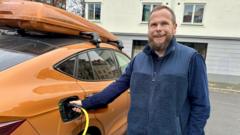Norway, known for its significant advancements in electric car adoption, is on track to become the first nation to phase out fossil-fuel vehicle sales, with electric cars accounting for 88.9% of new car sales in 2024.
Norway Leading the Charge Towards an All-Electric Future

Norway Leading the Charge Towards an All-Electric Future
Norway's transition to an electric vehicle-dominated landscape marks a pivotal moment in automotive history.
Norway has emerged as a global leader in electric vehicle (EV) adoption, with its unique strategies paving the way for a fossil-fuel-free future. The Nordic nation has been steadily transitioning to electric vehicles over the past three decades, making enormous strides in its pursuit of sustainability and zero-emission transportation.
In 2024, an impressive 88.9% of new cars sold in Norway were electric, highlighting a significant shift from traditional internal combustion engine (ICE) vehicles. This rise in electric vehicles has been accompanied by a robust network of charging stations, with over 27,000 public chargers now available across the country. This penetration of EVs onto the roads has surpassed petrol vehicles for the first time, with electric cars currently accounting for nearly 33% of total cars registered in Norway.
Harald A Møller, a car dealership in Oslo that has been operational for more than 75 years, has fully embraced this electric transition. By 2024, the company will exclusively sell electric vehicles and no longer offer internal combustion engine cars. According to chief executive Ulf Tore Hekneby, the future firmly lies within electric cars, emphasizing their practicality and performance.
Norwegian policymakers have skillfully incentivized the transition towards electric vehicles, initially introduced in the early 1990s to support local manufacturers. These incentives include eliminating taxes on EVs while increasing the costs associated with fuel-powered vehicles through heavier taxes, registration fees, and fees for petrol and diesel cars. Additional perks, such as free parking and lower toll fees for electric vehicles, have undoubtedly contributed to their popularity.
Norway remains a major oil producer, yet the country has grappled with how to balance its economic reliance on fossil fuels with its ambition to eliminate emissions in the transportation sector by 2025. Norwegian Deputy Transport Minister Cecilie Knibe Kroglund asserted the nation's goal to ensure all new car sales are "zero emission," a commitment that is well within reach.
Other nations, such as the United Kingdom and the United States, significantly lag behind Norway in electric vehicle adoption and infrastructure development. In the UK, electric cars accounted for merely 20% of new vehicle registrations, while the US saw an even lower figure of just 8%.
Experts believe that Norway's unique combination of wealth—thanks to its oil and gas exports—an abundance of renewable energy, and a commitment to strong, business-friendly policies have facilitated this transformation.
Christina Bu from the Norwegian EV Association emphasized that other countries can replicate Norway’s success by implementing suitable strategies tailored to their unique market conditions. “It’s about strong policies combined with public understanding of electric vehicles as a viable option,” she explained.
As Norway forges ahead on its path to an all-electric future, it stands as a powerful example for the world, showcasing the critical importance of targeted policies, supportive infrastructure, and an informed public to tackle climate change through transportation innovation.
In 2024, an impressive 88.9% of new cars sold in Norway were electric, highlighting a significant shift from traditional internal combustion engine (ICE) vehicles. This rise in electric vehicles has been accompanied by a robust network of charging stations, with over 27,000 public chargers now available across the country. This penetration of EVs onto the roads has surpassed petrol vehicles for the first time, with electric cars currently accounting for nearly 33% of total cars registered in Norway.
Harald A Møller, a car dealership in Oslo that has been operational for more than 75 years, has fully embraced this electric transition. By 2024, the company will exclusively sell electric vehicles and no longer offer internal combustion engine cars. According to chief executive Ulf Tore Hekneby, the future firmly lies within electric cars, emphasizing their practicality and performance.
Norwegian policymakers have skillfully incentivized the transition towards electric vehicles, initially introduced in the early 1990s to support local manufacturers. These incentives include eliminating taxes on EVs while increasing the costs associated with fuel-powered vehicles through heavier taxes, registration fees, and fees for petrol and diesel cars. Additional perks, such as free parking and lower toll fees for electric vehicles, have undoubtedly contributed to their popularity.
Norway remains a major oil producer, yet the country has grappled with how to balance its economic reliance on fossil fuels with its ambition to eliminate emissions in the transportation sector by 2025. Norwegian Deputy Transport Minister Cecilie Knibe Kroglund asserted the nation's goal to ensure all new car sales are "zero emission," a commitment that is well within reach.
Other nations, such as the United Kingdom and the United States, significantly lag behind Norway in electric vehicle adoption and infrastructure development. In the UK, electric cars accounted for merely 20% of new vehicle registrations, while the US saw an even lower figure of just 8%.
Experts believe that Norway's unique combination of wealth—thanks to its oil and gas exports—an abundance of renewable energy, and a commitment to strong, business-friendly policies have facilitated this transformation.
Christina Bu from the Norwegian EV Association emphasized that other countries can replicate Norway’s success by implementing suitable strategies tailored to their unique market conditions. “It’s about strong policies combined with public understanding of electric vehicles as a viable option,” she explained.
As Norway forges ahead on its path to an all-electric future, it stands as a powerful example for the world, showcasing the critical importance of targeted policies, supportive infrastructure, and an informed public to tackle climate change through transportation innovation.

















